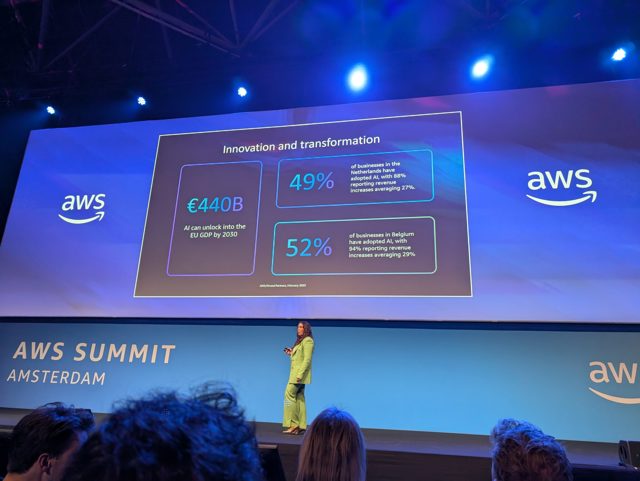< Back to news 


7 November 2023
AI is going to radically change medical world
Artificial Intelligence (AI) is on an unprecedented rise, including in the medical world.
Like any tool, AI is a tool that shows its real value mainly in the concrete applications. The opportunities are huge, but so is the downside risk. Involvement from the healthcare sector is therefore essential.
Professor and cardiologist Folkert Asselbergs is working on one such concrete application. He is developing an AI programme for heart failure with a European grant. Over 60 million people worldwide have heart failure and that number is only growing. Good individual tailor-made treatment is of great importance, but also extremely difficult because it is such a heterogeneous disease. Asselbergs: "Shortness of breath, faster fatigue and earlier fluid retention are symptoms of heart failure, but the underlying cause, and thus the prognosis, can vary greatly. In some people, hereditary factors play a major role, others have suffered a heart attack, and yet others have developed heart failure due to long-term high blood pressure; they can all be reasons why someone's heart is pumping less blood and the symptoms develop. Yet we treat all forms in the same way."
Decision-making tool
Asselbergs uses AI to design smart rules (algorithms) that can organise the huge flow of data from different data sources to understand prognosis and underlying causes. "AI brings precision medicine and data-driven work a bit closer again. You go from average treatment for an average patient to treatment that is more tailored to the individual patient. That's a nice point on the horizon."
An AI programme for heart failure as a clinical decision support tool - a tool that helps doctors in their clinical decision-making - offers great advantages, but can also be detrimental if algorithms are not well designed. Asselbergs cites a US programme that predicted which patient was at high risk of hospitalisation. "Black people there had a much lower risk than white people. Why? Because 'healthcare utilisation' was in the algorithm, and in America black people on average use less healthcare due to various socio-economic reasons. With such an algorithm, you can't really do anything in clinical practice."
Asselbergs' main aim is therefore to build a relatable tool for heart failure and does so by, among other things, not only including (patient) data from European countries. Hospitals, doctors and patients from Peru and Tanzania are also involved in the design, making the programme more socially and ethnically diverse and contextual. "We use a form of federated learning, which allows us to put a lot of diverse factors into a common model without the data having to leave the hospital to do so to ensure privacy. There we also add a so-called AI passport, which makes transparent what the knowledge or opinions are based on. Ultimately, we want to use it to distinguish clusters of patients, for example, who need little or intensive treatment. For an improvement in care that may also turn out cheaper."
A reliable chatbot
Psychiatrist Christiaan Vinkers (Professor of Stress and Resilience) uses a form of AI similar to ChatGPT (Chat Generative Pre-trained Transformer). ChatGPT is an AI chatbot trained by large language models. As a result, ChatGPT can answer questions that sound like they were generated by humans. Vinkers and colleagues developed EvidenceHunt, a programme that does the same but with reliable sources that provide transparent answers, such as scientific databases like PubMed and guidelines.
Vergelijkbaar >
Similar news items

April 16, 2025
AWS: Dutch businesses are adopting AI faster than the European average
New research from AWS shows that Dutch businesses are rapidly adopting AI—at a rate of one new implementation every four minutes, well ahead of the European average.
read more >

April 16, 2025
Submit your nomination for the Dutch Applied AI Award 2025
Do you know or develop an innovative AI application? Submit it now for the 2025 Dutch Applied AI Award, presented at the Computable Awards.
read more >

April 16, 2025
UK government tests AI to predict murders
The UK government is developing an AI system that could predict who is most likely to commit a serious crime. Critics call the project dangerous and discriminatory.
read more >